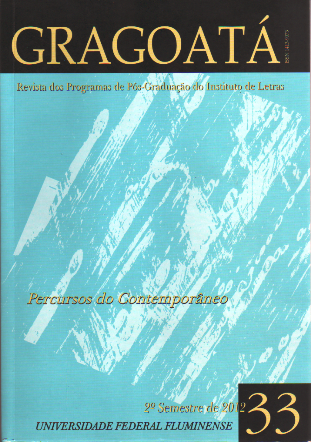Duas fábulas de cidade: configurações do espaço urbano em Bernardo Carvalho e João Cabral de Melo Neto
DOI:
https://doi.org/10.22409/gragoata.v17i33.33017Palavras-chave:
Bernardo Carvalho, “O Arquiteto”, narrativa contemporânea, influência, vestígios, João Cabral de Melo NetoResumo
O objetivo deste artigo é apresentar algumas considerações sobre as figurativizações contemporâneas da cidade a partir, especificamente, da leitura do conto “O arquiteto: um homem e uma mulher a caminho da polícia”, de Bernardo Carvalho (2004). Nesse conto, o escritor retoma o tema da cidade, seguindo uma tradição de textos da modernidade, desde Poe e Baudelaire, fazendo uníssono às representações da urbe verificadas em vários contos, romances e poemas brasileiros contemporâneos, mas recriando também, na corporalidade da sua escritura, densa e intensa, veloz e, em certa medida, agônica, os projetos utópicos das cidades ideais renascentistas, o que acentua o questionamento das utopias no contexto contemporâneo. Para ampliar a discussão proposta, pretende-se contrapor trechos do conto de Bernardo Carvalho a poemas de João Cabral de Melo Neto, estabelecendo, extensivamente, alguns parâmetros para a reflexão acerca da influência em certa vertente da literatura contemporânea, cujo epicentro se configura, de acordo com a leitura aqui proposta, menos pela supremacia do novo do que por uma estética das rasuras na origem, dos rastros e dos lastros que a reinvenção do cânone possibilita.
Downloads
Downloads
Publicado
Edição
Seção
Licença
AUTORIZAÇÃO
Autores que publicam em Gragoatá concordam com os seguintes termos:
Os autores mantêm os direitos e cedem à revista o direito à primeira publicação, simultaneamente submetido a uma licença Creative Commons Atribuição 4.0 Internacional (CC BY 4.0), que permite o compartilhamento por terceiros com a devida menção ao autor e à primeira publicação pela Gragoatá.
Os autores podem entrar em acordos contratuais adicionais e separados para a distribuição não exclusiva da versão publicada da obra (por exemplo, postá-la em um repositório institucional ou publicá-la em um livro), com o reconhecimento de sua publicação inicial na Gragoatá.
A Gragoatá utiliza uma Licença Creative Commons - Atribuição CC BY 4.0 Internacional.











